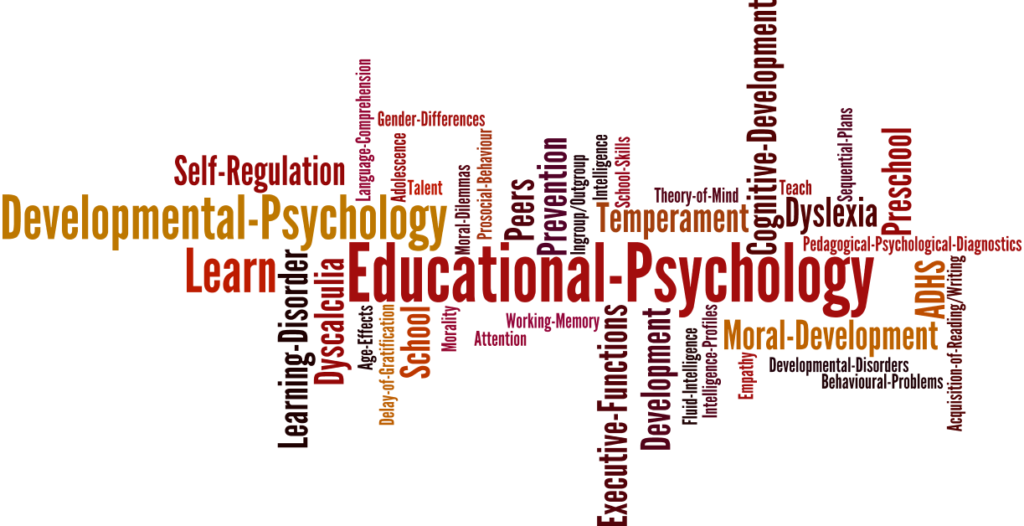
At the department for Developmental and Educational Psychology we focus on learning in different domains and development over the life span. The Developmental and Educational Psychology is represented by Prof. Daseking and her team.
Our research focuses on the development of educational-psychological tests, intelligence tests and intelligence diagnostics,
learning disorders, executive functions and ADHD , moral development in adolescence and the educational biographies
of young people who have fled.
Recent Publications
2025
Becker, A. B. C., Maurer, C., & Daseking, M. (2025). The relationship between language development and behavioral problems in preschool children who experienced a stroke. Zeitschrift für Neuropsychologie, 36(1), 15-27. https://doi.org/10.1024/1016-264X/a000407
Breit, M., Brunner, M., Preuß, J., Daseking, M., Pauls, F., Walter, F., & Preckel, F. (2025). The contribution of general intelligence to cognitive performance across the life span: A differentiation analysis of the Wechsler tests. Psychology and Aging, 40(3), 237–254. https://doi.org/10.1037/pag0000875
Daseking, M. & Urschitz, M. (2025). Aufgaben, Chancen und Herausforderungen der Schuleingangsuntersuchung in Deutschland. Gesundheitswesen, 87. https://doi.org/10.1055/a-2501-0295
Heinze, H., Daseking, M., Gawrilow, C., Karbach, J., & Kerner auch Koerner, J. (2025). Self-regulation in preschool: Are executive function and effortful control overlapping constructs? Developmental Science, 28(1), e13595. https://doi.org/10.1111/desc.13595
Ibrahim, F., Münscher, J.-C., Daseking, M., & Telle, N.-T. (2025). The Technology Acceptance Model and Adopter Type Analysis in the context of artificial intelligence. Frontiers in Artificial Intelligence, 7, 1496518. https://doi.org/10.3389/frai.2024.1496518
Jaščenoka, J. C., Maurer, J., Sierpinski, T., Diefenbach,C., & Daseking, M. (2025). Barrieren und förderliche Faktoren in der Schuleingangsuntersuchung mit SOPESS: Entwicklung eines Online-Fortbildungspakets zur Stärkung diagnostischer Grundkompetenzen (Projekt KOMET-SEU). Gesundheitswesen, 87. https://doi.org/10.1055/a-2550-4308
Malonga Makosi, D. M., Diefenbach, C., Simon, K., Jaščenoka, J. C., Maurer, J., Borrmann, B., Sidhu, N. S., König, J., Thyen, U., Genuneit, J., Daseking, M., & Urschitz, M. S. (2025). Nachhaltige Weiterentwicklung von Kompetenzen und Methoden am Beispiel SOPESS als Teil der Schuleingangsuntersuchung–Hintergrund und Ansätze des KOMET-SEU-Projekts. Das Gesundheitswesen, 87, 391–397. https://doi.org/10.1055/a-2577-9620
Schön, S.-M., & Daseking, M. (2025). We’re in this together: Associations between moral emotions and rule-breaking behaviour in adolescence. Emotional and Behavioural Difficulties. https://doi.org/10.1080/13632752.2025.2486898
Ulitzka, B., Daseking, M., & Kerner auch Koerner, J. (2025). The Marshmallow Test as a screening instrument: Sensitivity and specificity of a Delay of Gratification task for later ADHD and conduct problems. Infant and Child Development, 34:e70014. https://doi.org/10.1002/icd.70014
2024
Becker, A. B. C., Maurer, J., Daseking, M., & Pauls, F. (2024). Measurement invariance of the WISC-V across a clinical sample of children and adolescents with ADHD and a matched control group. Journal of Intelligence, 12, 6. https://doi.org/10.3390/jintelligence12010006
Hogan, M., Fischer, A., Dinçer, B., Yurt, E. C., Daseking, M., Irfan, M. R., Koruga, N., Riddle, R., & Quinn, S. (2024). Confirming the factor structure of the Student-Educator Negotiated Critical Thinking Dispositions Scale (SENCTDS). Preprint.
Moellmann, H. L., Rana, M., Daseking, M., Petersohn, H., & Rana, M. (2024). Exploring grandiose narcissism among surgeons: a comparative analysis. Scientific Reports, 14(1), 11665. https://doi.org/10.1038/s41598-024-62241-6
Neumann, H., Daseking, M., Thiels, C., Köhler, C., & Lücke, T. (2024). Cognitive development in children with new-onset Rolandic epilepsy and Rolandic discharges without seizures: Focusing on intelligence, visual perception, working memory and the role of parents’ education. Epilepsy & Behavior, 109596. https://doi.org/10.1016/j.yebeh.2023.109596
Schön, S.-M. & Daseking, M. (2024). Externalisierendes Problemverhalten mit Freund:innen im Jugendalter: Welche Rolle spielen Faktoren der emotionalen Unbeteiligtheit? Bundesgesundheitsblatt – Gesundheitsforschung – Gesundheitsschutz, 67, 392–399. https://doi.org/10.1007/s00103-024-03850-4
Schön, S.-M. & Daseking, M. (2024). Do moral emotions interact with self-control and unstructured socializing in explaining rule-breaking behavior committed together with friends? Children, 11, 766. https://doi.org/10.3390/children11070766
Ulitzka, B., Daseking, M., & Kerner auch Koerner, J. (2024). The Marshmallow Test as screenings instrument: Sensitivity and specificity of a delay of gratification tasks as a longitudinal predictor for ADHD and Conduct Problems. https://d197for5662m48.cloudfront.net/documents/publicationstatus/201915/preprint_pdf/17fc6a3452c38cde9f3becde5553376d.pdf
Walter, F., Daseking, M., & Pauls, F. (2024). The effects of language background and parental education on measures of cognitive ability: An analysis of the WPPSI-IV cognitive profiles of monolingual, simultaneous bilingual, and successive bilingual German children aged 4 to 7 years. Children, 11, 631. https://doi.org/10.3390/children11060631